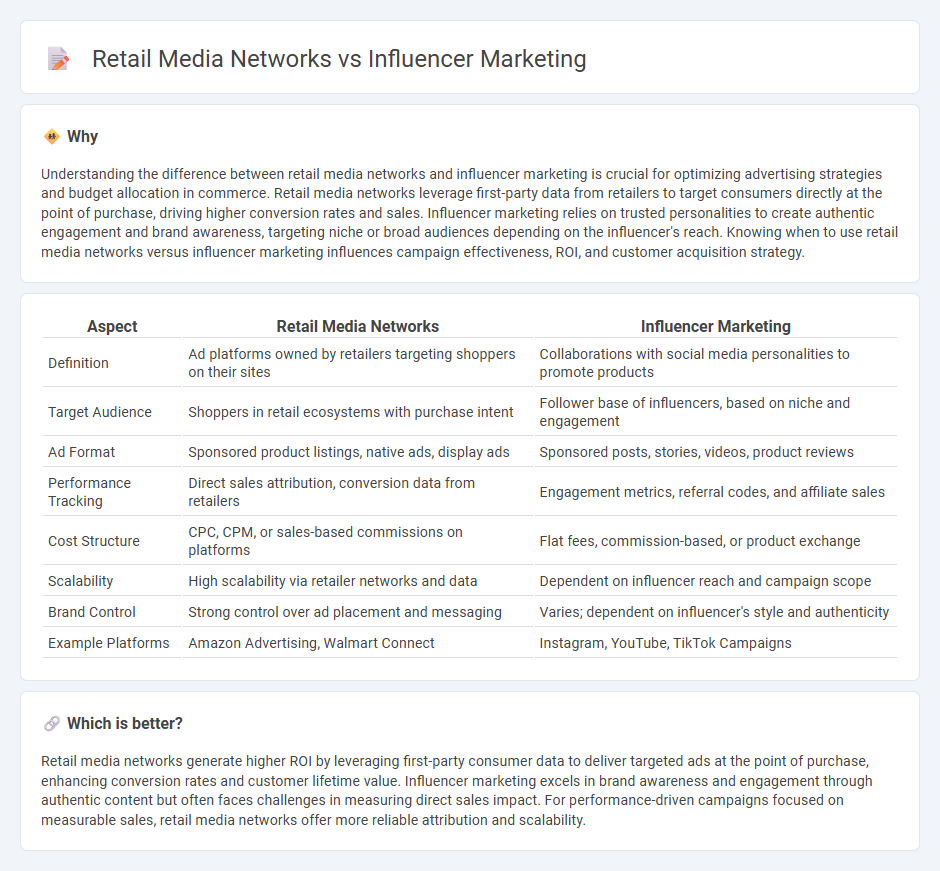
Retail media networks leverage first-party customer data to deliver highly targeted ad placements on e-commerce platforms, driving measurable sales and brand engagement. Influencer marketing harnesses the trust and reach of social media personalities to create authentic product endorsements, boosting brand awareness and customer loyalty. Explore in-depth insights on how these strategies transform commerce dynamics and optimize marketing ROI.
Why it is important
Understanding the difference between retail media networks and influencer marketing is crucial for optimizing advertising strategies and budget allocation in commerce. Retail media networks leverage first-party data from retailers to target consumers directly at the point of purchase, driving higher conversion rates and sales. Influencer marketing relies on trusted personalities to create authentic engagement and brand awareness, targeting niche or broad audiences depending on the influencer's reach. Knowing when to use retail media networks versus influencer marketing influences campaign effectiveness, ROI, and customer acquisition strategy.
Comparison Table
| Aspect | Retail Media Networks | Influencer Marketing |
|---|---|---|
| Definition | Ad platforms owned by retailers targeting shoppers on their sites | Collaborations with social media personalities to promote products |
| Target Audience | Shoppers in retail ecosystems with purchase intent | Follower base of influencers, based on niche and engagement |
| Ad Format | Sponsored product listings, native ads, display ads | Sponsored posts, stories, videos, product reviews |
| Performance Tracking | Direct sales attribution, conversion data from retailers | Engagement metrics, referral codes, and affiliate sales |
| Cost Structure | CPC, CPM, or sales-based commissions on platforms | Flat fees, commission-based, or product exchange |
| Scalability | High scalability via retailer networks and data | Dependent on influencer reach and campaign scope |
| Brand Control | Strong control over ad placement and messaging | Varies; dependent on influencer's style and authenticity |
| Example Platforms | Amazon Advertising, Walmart Connect | Instagram, YouTube, TikTok Campaigns |
Which is better?
Retail media networks generate higher ROI by leveraging first-party consumer data to deliver targeted ads at the point of purchase, enhancing conversion rates and customer lifetime value. Influencer marketing excels in brand awareness and engagement through authentic content but often faces challenges in measuring direct sales impact. For performance-driven campaigns focused on measurable sales, retail media networks offer more reliable attribution and scalability.
Connection
Retail media networks leverage influencer marketing by utilizing popular content creators to amplify product visibility and drive targeted sales through personalized advertising campaigns. Influencers create authentic content that resonates with specific consumer segments, enhancing the effectiveness of retail media's data-driven strategies. This synergy boosts customer engagement and maximizes ROI by integrating social influence with precise retail targeting.
Key Terms
Audience Reach
Influencer marketing leverages the authentic connections influencers have with niche audiences, often resulting in highly engaged and targeted reach across social media platforms like Instagram, TikTok, and YouTube. Retail media networks use first-party shopper data from e-commerce giants such as Amazon and Walmart to deliver personalized ads directly within the retail environment, ensuring high-intent customer exposure. Explore how combining these strategies can maximize audience reach and drive sales growth.
Attribution
Influencer marketing attribution leverages unique tracking links and engagement metrics to directly measure the impact of individual content creators on consumer behavior and sales conversions. Retail media networks utilize first-party purchase data and advanced analytics to attribute advertising spend across multiple touchpoints within their ecosystem, providing granular insights into the customer journey. Explore detailed strategies and technological solutions to optimize attribution accuracy in both influencer marketing and retail media networks.
Monetization
Influencer marketing monetizes by leveraging trusted personalities to drive authentic consumer engagement and brand loyalty, often through sponsored content and affiliate links. Retail media networks generate revenue by offering brands targeted advertising within e-commerce platforms, utilizing shopper data to optimize ad placements and ROI. Explore how these distinct monetization strategies can amplify your marketing impact.
Source and External Links
Influencer marketing - Influencer marketing is a social media marketing strategy where brands collaborate with influencers, individuals with expert knowledge or social influence, who create sponsored content to endorse or place products, shaping consumer behavior through their credibility and audience.
What Is Influencer Marketing? - Influencer marketing enables brands to work with individuals who have dedicated followings to increase brand exposure by setting clear goals, identifying target audiences, and budgeting for meaningful collaborative campaigns.
All You Need to Know to Plan, Execute, and Generate ROI - Influencer marketing involves collaborations with professional influencers that publicly endorse brands to build market position, credibility, and generate measurable ROI using tailored strategies across various social platforms.
 dowidth.com
dowidth.com